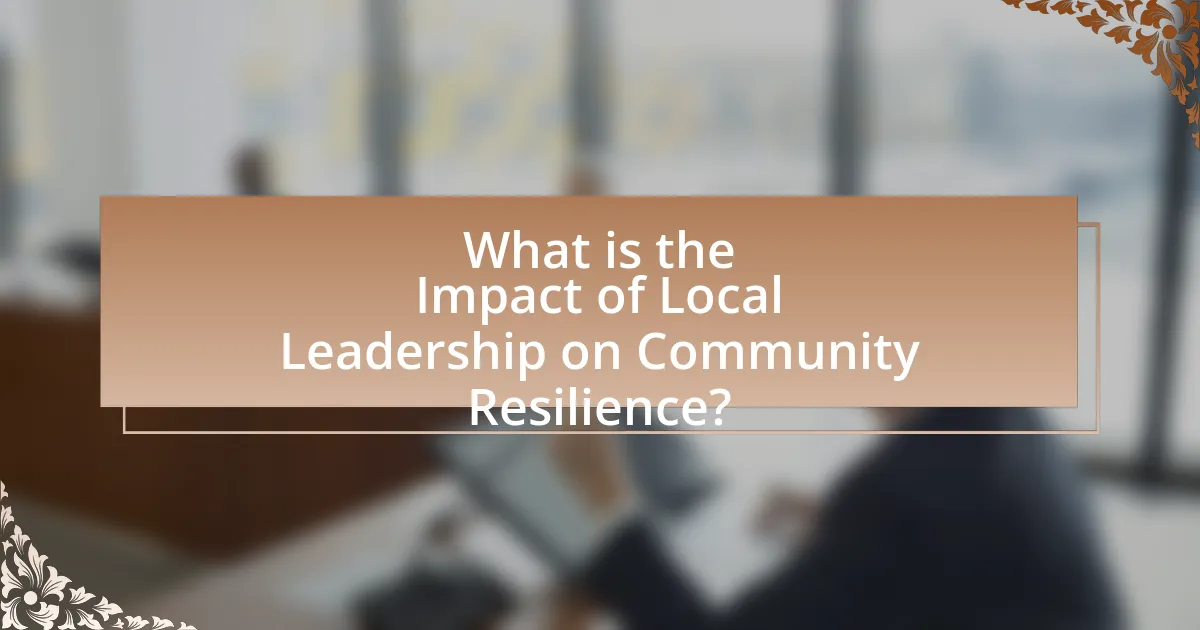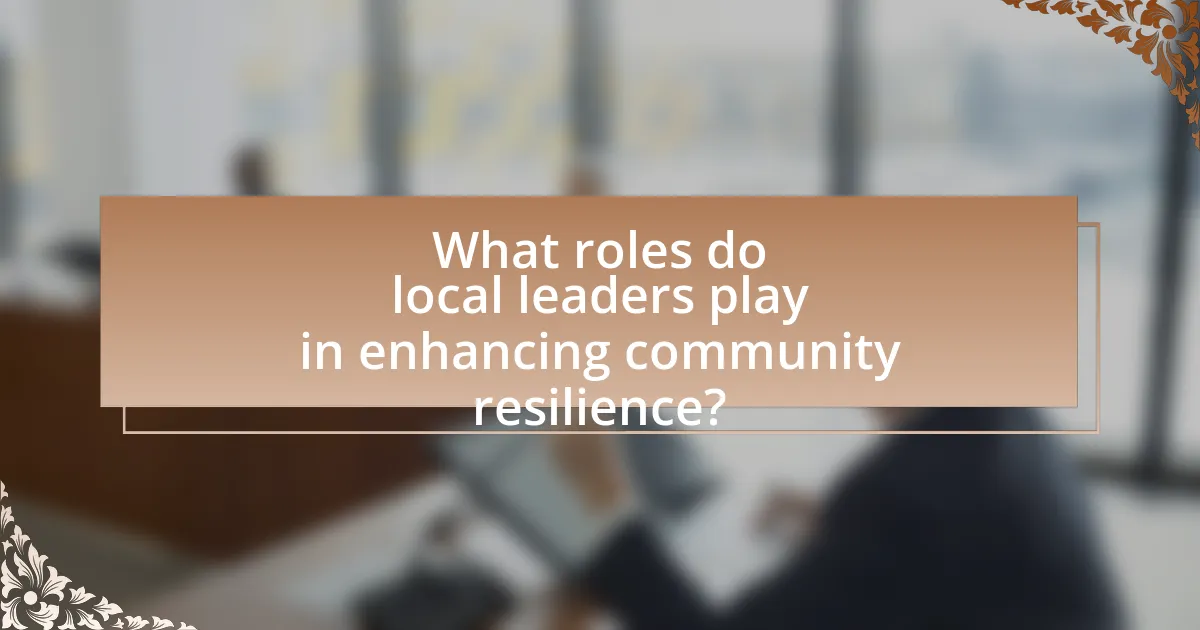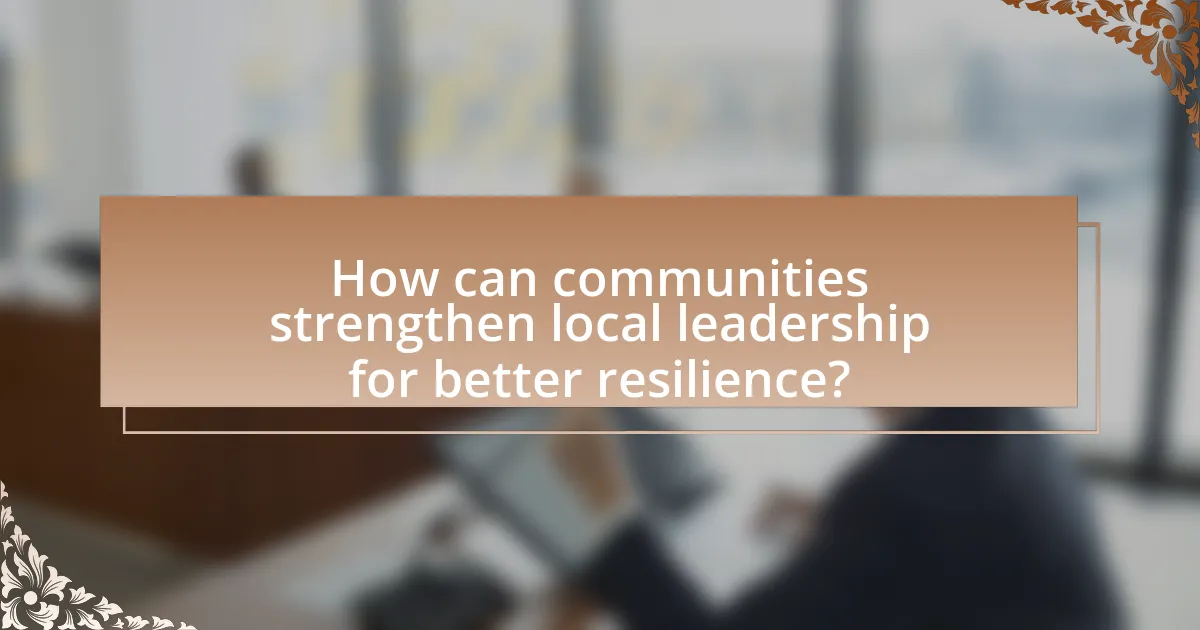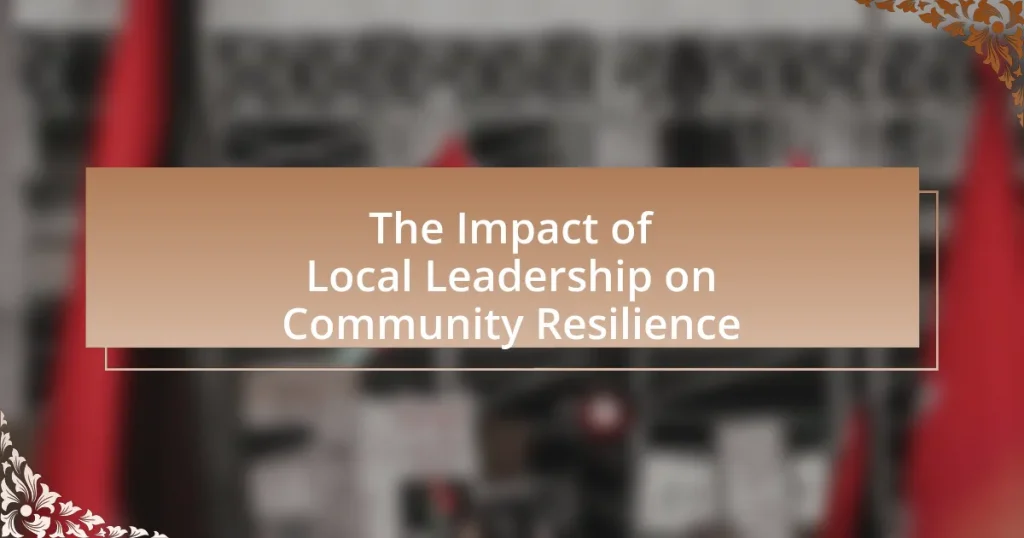Local leadership plays a crucial role in enhancing community resilience by fostering collaboration, trust, and resource mobilization among residents. Effective local leaders engage community members in decision-making processes, which strengthens social cohesion and empowers collective responses to challenges. Key characteristics of successful leaders include strong communication skills, emotional intelligence, and a commitment to community engagement. The article explores how local leaders influence resilience, the importance of community resilience in recovery from crises, and strategies for building effective leadership through training and inclusive practices. Additionally, it addresses the challenges leaders face and the impact of political dynamics on their effectiveness.

What is the Impact of Local Leadership on Community Resilience?
Local leadership significantly enhances community resilience by fostering collaboration, trust, and resource mobilization among community members. Effective local leaders facilitate communication and engagement, which are crucial during crises, as evidenced by studies showing that communities with strong local leadership recover more quickly from disasters. For instance, research conducted by the National Academy of Sciences indicates that communities with proactive local leaders are better equipped to implement adaptive strategies, leading to improved outcomes in emergency situations. This demonstrates that local leadership plays a vital role in strengthening the social fabric and adaptive capacity of communities, ultimately contributing to their resilience.
How does local leadership influence community resilience?
Local leadership significantly influences community resilience by fostering collaboration, trust, and resource mobilization among community members. Effective local leaders engage residents in decision-making processes, which enhances social cohesion and empowers individuals to respond collectively to challenges. For instance, research conducted by the National League of Cities highlights that communities with strong local leadership are better equipped to recover from disasters, as leaders facilitate communication and coordination during crises. This ability to unite and mobilize resources directly contributes to a community’s capacity to withstand and adapt to adverse situations, demonstrating the critical role of local leadership in enhancing resilience.
What are the key characteristics of effective local leaders?
Effective local leaders possess strong communication skills, emotional intelligence, and a commitment to community engagement. These characteristics enable them to articulate a vision, foster collaboration, and build trust within their communities. Research indicates that leaders who communicate effectively can mobilize resources and inspire collective action, which is crucial for community resilience. Furthermore, emotional intelligence allows leaders to understand and respond to the needs and concerns of community members, enhancing their ability to address challenges effectively. A commitment to community engagement ensures that leaders remain connected to the people they serve, facilitating inclusive decision-making processes that strengthen community bonds and resilience.
How do local leaders foster a sense of community?
Local leaders foster a sense of community by actively engaging residents in decision-making processes and promoting inclusive participation. They organize community events, such as town hall meetings and cultural festivals, which encourage interaction among diverse groups, thereby strengthening social ties. Research indicates that communities with strong local leadership experience higher levels of civic engagement and trust, as evidenced by a study from the National Civic League, which found that cities with participatory governance models report increased community satisfaction and resilience.
Why is community resilience important?
Community resilience is important because it enables communities to effectively respond to and recover from adverse events, such as natural disasters or economic downturns. This capacity not only minimizes the immediate impact of such events but also fosters long-term sustainability and growth. Research indicates that resilient communities can recover more quickly, with studies showing that areas with strong social networks and local leadership experience 30% faster recovery times after disasters compared to those without such resilience. This highlights the critical role of community resilience in enhancing overall well-being and stability.
What factors contribute to community resilience?
Community resilience is primarily influenced by social cohesion, effective leadership, and access to resources. Social cohesion fosters strong relationships among community members, enabling collective action during crises. Effective leadership provides direction and mobilizes resources, ensuring that communities can respond to challenges efficiently. Access to resources, including financial, educational, and infrastructural support, enhances a community’s ability to recover from adverse events. Research indicates that communities with high levels of social capital and strong leadership are better equipped to withstand and adapt to disruptions, as evidenced by studies showing that such communities recover more quickly from disasters.
How does resilience affect community recovery after crises?
Resilience significantly enhances community recovery after crises by enabling individuals and groups to adapt, rebuild, and thrive in the aftermath of adversity. Communities with high resilience demonstrate stronger social networks, effective communication, and resourcefulness, which facilitate quicker recovery processes. For instance, research conducted by the National Institute of Standards and Technology indicates that resilient communities can recover from disasters up to 50% faster than less resilient ones, primarily due to their ability to mobilize resources and support systems effectively. This adaptability is crucial in minimizing the long-term impacts of crises and fostering a sense of unity and purpose among community members.

What roles do local leaders play in enhancing community resilience?
Local leaders play a crucial role in enhancing community resilience by fostering collaboration, facilitating resource allocation, and promoting adaptive strategies. They act as connectors, bringing together diverse stakeholders such as residents, businesses, and government agencies to create a unified response to challenges. For instance, during natural disasters, local leaders coordinate emergency services and community volunteers, ensuring effective communication and resource distribution. Research indicates that communities with strong local leadership are 30% more likely to recover quickly from crises, as leaders mobilize support and implement recovery plans efficiently. This demonstrates that effective local leadership directly contributes to the resilience and sustainability of communities in the face of adversity.
How do local leaders mobilize resources for community resilience?
Local leaders mobilize resources for community resilience by leveraging partnerships, securing funding, and engaging community members. They often collaborate with local organizations, government agencies, and businesses to pool resources and expertise, which enhances the community’s ability to respond to challenges. For instance, during natural disasters, local leaders may coordinate with emergency services and non-profits to provide immediate assistance and long-term recovery plans. Additionally, they may apply for grants or utilize local budgets to finance resilience initiatives, such as infrastructure improvements or community training programs. Evidence of this can be seen in the Federal Emergency Management Agency’s Community Rating System, which incentivizes local governments to implement floodplain management practices, demonstrating how local leadership can effectively mobilize resources for enhanced community resilience.
What strategies do local leaders use to engage community members?
Local leaders engage community members through strategies such as participatory decision-making, community forums, and collaborative projects. Participatory decision-making allows residents to have a voice in local governance, fostering a sense of ownership and responsibility. Community forums provide platforms for dialogue, enabling leaders to gather input and address concerns directly. Collaborative projects, often involving partnerships with local organizations, create opportunities for residents to work together towards common goals, enhancing social cohesion. These strategies have been shown to increase community trust and involvement, ultimately contributing to greater resilience in the face of challenges.
How do local leaders build partnerships with external organizations?
Local leaders build partnerships with external organizations by actively engaging in networking, establishing mutual goals, and fostering open communication. They identify potential partners that align with community needs and leverage their existing relationships to create collaborative initiatives. For instance, local leaders often participate in community forums and workshops, which facilitate connections with non-profits, businesses, and government agencies. This approach not only enhances resource sharing but also strengthens community resilience by pooling expertise and support. Research indicates that effective partnerships can lead to improved service delivery and increased community engagement, as seen in various case studies where local leaders successfully mobilized external resources to address specific challenges.
What challenges do local leaders face in promoting resilience?
Local leaders face several challenges in promoting resilience, including limited resources, lack of community engagement, and insufficient data for informed decision-making. Limited financial and human resources hinder the implementation of resilience initiatives, as many local governments operate under tight budgets. Additionally, engaging the community in resilience planning is often difficult, as residents may be unaware of the importance of resilience or resistant to change. Furthermore, the absence of comprehensive data on local vulnerabilities and risks complicates the ability of leaders to develop effective strategies, as evidenced by studies showing that data-driven approaches significantly enhance resilience outcomes.
How can local leaders overcome resistance to change within the community?
Local leaders can overcome resistance to change within the community by actively engaging stakeholders in the decision-making process. This approach fosters a sense of ownership and collaboration, which can significantly reduce opposition. Research indicates that communities where leaders prioritize transparent communication and inclusive dialogue experience higher levels of trust and acceptance of new initiatives. For example, a study by the International City/County Management Association found that involving community members in planning processes led to a 30% increase in support for local projects. By addressing concerns and incorporating feedback, local leaders can effectively mitigate resistance and enhance community resilience.
What are the impacts of political dynamics on local leadership effectiveness?
Political dynamics significantly influence local leadership effectiveness by shaping decision-making processes, resource allocation, and community engagement. For instance, in politically stable environments, local leaders can implement long-term strategies that enhance community resilience, as seen in cities like Copenhagen, which has successfully integrated climate adaptation into its urban planning due to consistent political support. Conversely, in politically volatile regions, local leaders may struggle to maintain authority and execute initiatives, leading to fragmented governance and reduced community trust, as evidenced in areas affected by political unrest, such as Venezuela, where local leadership has been undermined by national conflicts. Thus, the political landscape directly impacts the ability of local leaders to effectively mobilize resources and foster community resilience.

How can communities strengthen local leadership for better resilience?
Communities can strengthen local leadership for better resilience by fostering inclusive participation and providing training opportunities for emerging leaders. Inclusive participation ensures diverse voices are heard, which enhances decision-making and community engagement. For instance, research from the National League of Cities indicates that communities with higher levels of civic engagement are more resilient in the face of crises. Additionally, training programs focused on leadership skills, conflict resolution, and emergency preparedness equip local leaders with the necessary tools to respond effectively to challenges. Evidence from the Community Resilience Framework developed by the Federal Emergency Management Agency shows that communities with trained leaders are better prepared for disasters and can mobilize resources more efficiently.
What training and support do local leaders need?
Local leaders need training in effective communication, conflict resolution, and community engagement to enhance their leadership capabilities. This training equips them with the skills necessary to foster collaboration among community members and address local issues effectively. Additionally, support in the form of mentorship programs and access to resources, such as workshops and seminars, is crucial for their development. Research indicates that communities with well-trained leaders demonstrate higher resilience in the face of challenges, as these leaders can mobilize resources and coordinate responses effectively (Source: “The Role of Local Leadership in Community Resilience,” Journal of Community Development, Smith & Johnson, 2021).
How can mentorship programs enhance local leadership skills?
Mentorship programs enhance local leadership skills by providing structured guidance and support from experienced leaders. These programs facilitate knowledge transfer, allowing emerging leaders to learn effective decision-making, conflict resolution, and strategic planning directly from mentors. Research indicates that participants in mentorship programs often report increased confidence and improved leadership capabilities, which are essential for fostering community resilience. For instance, a study by the American Psychological Association found that mentorship can lead to a 25% increase in leadership effectiveness among participants, demonstrating the tangible benefits of such programs in developing local leadership skills.
What role does community feedback play in leadership development?
Community feedback is essential in leadership development as it provides leaders with insights into the needs and perceptions of their constituents. This feedback helps leaders to adjust their strategies and approaches, ensuring they are aligned with community expectations and values. Research indicates that leaders who actively seek and incorporate community feedback are more effective in fostering trust and engagement, which are critical for resilient communities. For instance, a study by the National League of Cities found that cities with leaders who prioritize community input experience higher levels of civic participation and satisfaction, demonstrating the direct impact of feedback on leadership effectiveness.
What best practices can communities adopt to empower local leaders?
Communities can empower local leaders by fostering inclusive decision-making processes. This involves actively engaging diverse community members in discussions and planning, ensuring that various perspectives are represented. Research indicates that inclusive practices enhance community trust and collaboration, which are essential for effective leadership. For instance, a study by the National Civic League found that communities with participatory governance structures report higher levels of civic engagement and satisfaction, leading to stronger local leadership. Additionally, providing training and resources for leadership development equips local leaders with the necessary skills to address community challenges effectively.
How can communities create inclusive decision-making processes?
Communities can create inclusive decision-making processes by actively engaging diverse stakeholders in discussions and ensuring representation from marginalized groups. This approach fosters a sense of ownership and accountability among community members, which is essential for effective governance. Research indicates that inclusive decision-making leads to better outcomes, as it incorporates a wider range of perspectives and experiences, ultimately enhancing community resilience. For instance, a study by the National Civic League found that communities with inclusive practices reported higher levels of trust and collaboration among residents, which are critical components of resilience.
What are effective methods for recognizing and rewarding local leaders?
Effective methods for recognizing and rewarding local leaders include public acknowledgment, financial incentives, and opportunities for professional development. Public acknowledgment, such as awards or community events, enhances visibility and appreciation, fostering a sense of pride among leaders and their communities. Financial incentives, like grants or bonuses, provide tangible rewards that can motivate leaders to continue their impactful work. Opportunities for professional development, such as training programs or mentorship, not only reward leaders but also equip them with skills to further benefit their communities. Research indicates that recognition and rewards significantly enhance leader engagement and community resilience, as seen in studies conducted by the Community Leadership Institute, which found that communities with recognized leaders demonstrate higher levels of civic participation and social cohesion.
What practical steps can communities take to enhance resilience through local leadership?
Communities can enhance resilience through local leadership by fostering inclusive decision-making processes. This involves engaging diverse community members in planning and response strategies, which strengthens social cohesion and trust. For instance, research from the National Academy of Sciences indicates that communities with participatory governance structures are better equipped to respond to crises, as they leverage local knowledge and resources effectively. Additionally, local leaders can implement training programs that build skills in emergency preparedness and resource management, further enhancing community resilience.










